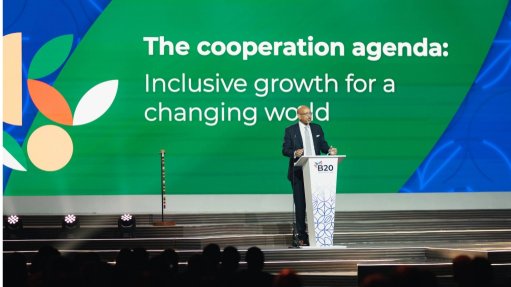Indaba panel unpacks challenges to Africa’s industrialisation agenda
The African export basket continues to lack manufactured products and is overly-reliant on raw materials and in cases, a single commodity; as a result, African countries continue to be affected by commodity volatility and to experience high inequality.
Speaking during the Manufacturing Indaba on December 9, consultancy Deloitte emerging markets and Africa MD Dr Martyn Davies said countries with high levels of manufacturing value-add (MVA) had better opportunities to create employment and achieve higher equality.
He explained that the countries with the highest Gini coefficients, or most inequality, had lower MVA as a percentage of gross domestic product (GDP). Davies mentioned that resource-driven economies have "baked-in inequalities".
MVA as a percentage of GDP was 17% globally in 2017, while sub-Saharan Africa averaged 10.2%.
South Africa has the highest MVA at 13.4% of GDP, compared with about 25% of GDP 20 years ago.
Botswana, meanwhile, has the lowest MVA at 6.4% of GDP.
Davies asked panellists how manufacturing could become more of a powerhouse industry for emerging economies in Africa and how African countries could move the needle toward industrialising their economies.
Department of Trade, Industry and Competition deputy director-general Lerato Mataboge said Africa currently contributed about 2% to global manufacturing and 3% to global trade, which left much to be desired.
Metal Fabricators of Zambia MD Roseta Mwape-Chabala stated that infrastructure was key to the solution, especially in landlocked countries such as Zambia.
She explained that it cost about twice as much to transport goods by road than by sea, which posed special considerations for the country’s manufacturing sector.
She added that moving goods by road brought about extra challenges in areas where roads were not in a good condition, or where border posts resulted in delays to goods reaching their destination.
Kenya-based hardware prototyping makerspace Gearbox executive director Dr Kamau Gachigi said that, with Covid-19 bringing about disruption to global supply chains, it had forced a rethink of local manufacturing capability, which boded well for the African continent, particularly now that the African Continental Free Trade Agreement (AfCFTA) would be coming into effect from January.
He noted that an inter-Ministerial effort was necessary to build the various parts of the economy necessary to make possible the supply of what was required in-country to make the most of the country’s particular resources.
Gachigi added that human resources development was vital to picking up any economy’s manufacturing capability and competitiveness and that no country should neglect the development of skills required in the manufacturing sector.
He mentioned that there were a lack of ecosystems to spur innovation in most African countries. “There is an inability for innovators to, for example, make a prototype to see how a product can be optimised or developed. Hence our offering to create collective spaces for people to use machines to develop products and see whether we can help them get the products into the market.
“Talent and innovation, when trying to increase your scale of economic complexity, are real drivers of growth. Policy needs to support and incentivise those innovation efforts.”
Mwape-Chabala agreed, stating that these type of blockages should be addressed. She said countries need to invest in supportive structures, or ecosystems, to make manufacturing sustainable.
South African Electrotechnical Export Council CEO Chiboni Evans stated that every country was now trying to increase its local content, but, in the context of the AfCFTA, there was a need to look at increasing Africa's combined local content.
She believed the solution would be for countries to create “centres of excellence” and focus on a particular type of manufacturing input or service offering for distribution throughout the continent.
For example, this was the case with rail manufacturing for South Africa, with the country creating a manufacturing base for rolling stock and offering places of training for the related skills.
Responding to why Africa became so reliant on exporting natural resources instead of local beneficiation and manufacturing, Namibia-based agriculture and fashion company Leap Holdings group MD Ally Angula said, in Namibia’s case, it had simply been easier and cheaper to import various products from South Africa, which had an existing manufacturing base.
“The resources game has made us lazy. Because it has been easier to just import products, and with raw resources having a guaranteed return on investment, there has not been incentive for the country to invest in local manufacturing capability.
“However, that is starting to change. The Namibian government has over the last five years increasingly promoted and campaigned for local manufacturing and buying local. For example, Namibia had started producing its own face masks, thanks to government’s support for the textile manufacturing industry,” she explained.
She agreed with the other panellists that African countries should determine their areas of expertise or build industries around their most viable resources. For example, with Namibia having an abundancy of sunlight, it could become a major energy exporter and bring down its cost of manufacturing in the country.
World Economic Forum future of advanced manufacturing head Francisco Betti shared Gachigi’s view that Covid-19 brought about unprecedented disruption to global supply chains and manufacturing and said it had helped to bring manufacturing back onto the global agenda.
“It has created a window of opportunity to further accelerate industrialisation globally. The pandemic helped many in the private sector realise that they could produce certain products locally and that the value-add to these new industries can increase over time.
“We have seen new innovations and companies coming together to manufacture ventilators. We also saw new levels of collaboration between the private and public sectors, civil society and academia. For these new levels of innovation, we need new incentives from government.”
Betti added that manufacturing was a long-term game and that long-term strategies would help ensure inclusive and sustainable development, coordinated with policy.
Export Credit Insurance Corporation of South Africa spokesperson and senior economist Sindiso Ndlovu lamented that intra-Africa trade would not be effective as long as it remained cheaper to import products from Europe or Asia.
She noted that the focus for all countries should be to facilitate investment toward reducing costs, mainly through implementing infrastructure.
Ndlovu highlighted that infrastructure was necessary for access to energy, transport networks and even soft infrastructure such as information technology systems at border posts to reduce waiting times.
The panellists conceded that regional value chains would certainly boost Africa’s manufacturing capability and trade, and that development should be spurred by the continent’s AfCFTA agenda.
Article Enquiry
Email Article
Save Article
Feedback
To advertise email advertising@creamermedia.co.za or click here
Comments
Press Office
Announcements
What's On
Subscribe to improve your user experience...
Option 1 (equivalent of R125 a month):
Receive a weekly copy of Creamer Media's Engineering News & Mining Weekly magazine
(print copy for those in South Africa and e-magazine for those outside of South Africa)
Receive daily email newsletters
Access to full search results
Access archive of magazine back copies
Access to Projects in Progress
Access to ONE Research Report of your choice in PDF format
Option 2 (equivalent of R375 a month):
All benefits from Option 1
PLUS
Access to Creamer Media's Research Channel Africa for ALL Research Reports, in PDF format, on various industrial and mining sectors
including Electricity; Water; Energy Transition; Hydrogen; Roads, Rail and Ports; Coal; Gold; Platinum; Battery Metals; etc.
Already a subscriber?
Forgotten your password?
Receive weekly copy of Creamer Media's Engineering News & Mining Weekly magazine (print copy for those in South Africa and e-magazine for those outside of South Africa)
➕
Recieve daily email newsletters
➕
Access to full search results
➕
Access archive of magazine back copies
➕
Access to Projects in Progress
➕
Access to ONE Research Report of your choice in PDF format
RESEARCH CHANNEL AFRICA
R4500 (equivalent of R375 a month)
SUBSCRIBEAll benefits from Option 1
➕
Access to Creamer Media's Research Channel Africa for ALL Research Reports on various industrial and mining sectors, in PDF format, including on:
Electricity
➕
Water
➕
Energy Transition
➕
Hydrogen
➕
Roads, Rail and Ports
➕
Coal
➕
Gold
➕
Platinum
➕
Battery Metals
➕
etc.
Receive all benefits from Option 1 or Option 2 delivered to numerous people at your company
➕
Multiple User names and Passwords for simultaneous log-ins
➕
Intranet integration access to all in your organisation




















